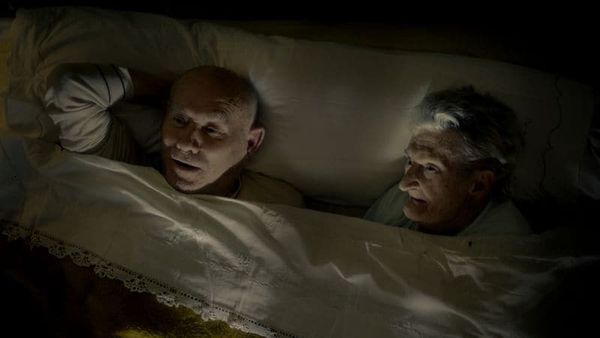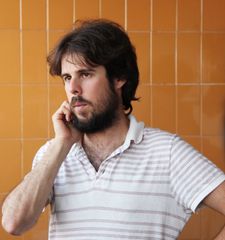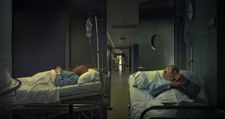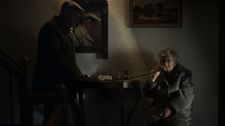 |
| Hermes Paralluelo: 'I'm very interested in portraying the feeling of when your energy is getting lower and you're thinking you're near to death' |
AW: It's interesting to see you have quite a lot of documentary funding at the end of the film but it has a strong narrative. Did you intend to start it off as a documentary originally and did you write the story around that - how did it come together?
HP: The real interest to me was to base the fiction around their reality.
AW: How did you your grandparents feel about you suddenly being in their lives with a camera as opposed to you just being normally around?
HP: I was thinking about that when they were doing the rehearsals. I was thinking, now I have a little camera and we are just talking but I was worried about what would happen when I had the big camera and all the stuff - how would they feel? At first, when they were doing the rehearsals, they would say, 'My grandson wants to play for a while, it's not that serious.' But when they saw the crew, the camera and the lighting and everything, they said, 'Come on, this is real and this is really important and we will be more involved.' Then my gran asked me: 'Are you the boss of all these guys? You're in charge?'
AW: Was a lot of it scripted for them or were you just capturing things they were saying?
 |
| Hermes Paralluelo Photo: Courtesy of Karlovy Vary Film Festival |
AW: Did you collaborate with them on the path the movie would take? Did you talk to them about the plot? Or did you just say, 'This is the story I'd like to tell and I'm just going to use bits of what you've told me to tell that?'
HP: While they were talking, I would find links between one thing and another and try to create a structure. But everything came from them and their talks and what they were feeling. And then I thought let's find a narrative way of explaining what they have told me. So it's real but at the same time I was the one who decided how to tell the story and construct the movie.
AW: What about the other people who are in the movie? Were they all non-professional?
HP: Yes, all the actors were non-professionals. What they do in the movie, they do in real-life. My grandad Antonio, says that's very important, that everyone in the movie is 'real' - this is the truth.
AW: Did it make it easier because it was your family - or did it make it worse?
HP: My grandma said, 'What will people think when they see me spend all day in bed?' She's very rebellious and sometimes it's impossible to direct her. I'd say, 'Go to the right' and she'd go to the left. Most of the time she would do what I asked but it was really fascinating for me, being in front of a force of nature that you can't control because at the same time, she gives you a lot stuff.
AW: I'm interested in some of the themes that are in the movie - ageing and the idea of loneliness. And you bring a lot of tension in a corridor between their two bedrooms, where there is a camera tracking, we begin to fear what it might discover. How easy or difficult is that sort of thing to come up with and shoot. And were you worried about the audience at all? That they might be shocked by the sudden tension and fear?
Every time I shot that sort of sequence, when they had to walk for a while or go upstairs, I felt that way - feeling the effort that they were making and it was like a big goal for them to get up there, although it's something easy for us. And you will feel that tension in the movie - I've tried to express what I felt behind the camera, like, 'Come on!'
Regarding the two rooms, I thought we should move exactly as he would move. What I wanted to show is that when they are both separated, there is something linking them somehow, so that's why I would that technique, so the audience could feel the tension of them being separated. In the whole movie, the main objective is that this invisible link and tension is portrayed.
 |
| 'What I wanted to show is that when they are both separated, there is something linking them' |
HP: I wasn't thinking about comedy but most of all he wanted to express the weirdness of a clock that should wake you up but it doesn't - it's like an alien, you're dealing with something you don't understand. Most of all, when you are an old man or woman and you're too old or too tired to deal with them. And I wanted to show the absurdity of it. On the one hand, you have the comic and the absurd but at the same time there is a dramatic weight related to electronic things that you have to deal with and all that is around you that is basic for your life but that you can't control. So it is absurd and comic somehow but also very dramatic that you are not even able to set the clock to wake you up. It seems so easy and basic it for our lives.
AW: Do they actually have a bell in their rooms?
HP: Yes, when they are angry with each other, he goes to another room. At the beginning, she had a little bell [Paralluelo makes a dainty 'kling-a-ling' noise] but my grandfather is getting deaf and, after that, they install the massive alarm [He makes a noise that would not be out of place in Das Boot]. It's more powerful than the doorbell. He sleeps only one metre in front of the sound. He wakes up with the vibration of the bed.
AW: Does it worry you, getting old?
HP: Maybe, yes. I have a little fear. But also I have a real curiosity for this part of life and I'm very interested in portraying the feeling of when your energy is getting lower and you're thinking you're near to death. I'm interested in being close to the end of your life - I'm not sure if that means the end of the world or if something else when this happens. And that's fascinating. That's why older people are really interesting. Because they are very close to that fact that they are going to disappear very soon. When I try to make films, I try to disappear myself and turn into something else through cinema. So I'm fascinated in this.
AW: What do you think you will do next? It's a unique thing to shoot with your family? Will it be more documentary or fiction or are you more interested in this meeting place between documentary and fiction?
 |
| 'When I try to make films, I try to disappear myself and turn into something else through cinema.' |
AW: Will it be real people?
HP: Yes, real people playing a version of themselves. My main interest is to find the fiction in the real people - their fiction - and to work with that and to convert the fiction into a cinematographic idea.
AW: Is it difficult to get people involved with that outside of your family?
HP: No. I'm very charming! My first film involved working with a family - not mine but the work is similar, it's very intimate. I need to understand the human being that I have in front me, that's the most important thing for me and spend time with them and try to understand their complexity. It's a long process. This film took three years. I began working on the latest one around six months ago.
AW: What did they think when they saw the film with the public?
HP: My grandma said it felt like a dream or something that she was seeing. It's very funny because she would notice things I wasn't expecting. One of the most emotional things for her was listening to herself callilng, 'Antonio!'. She likes that people laugh when they hear her shouting.





















